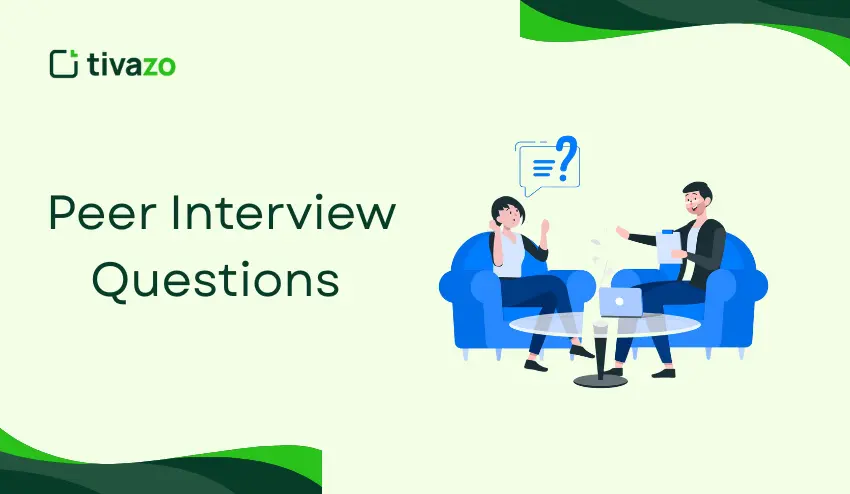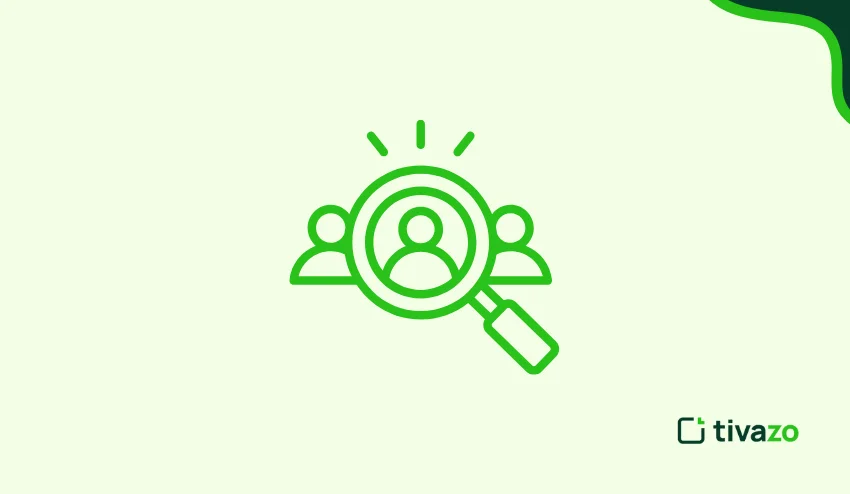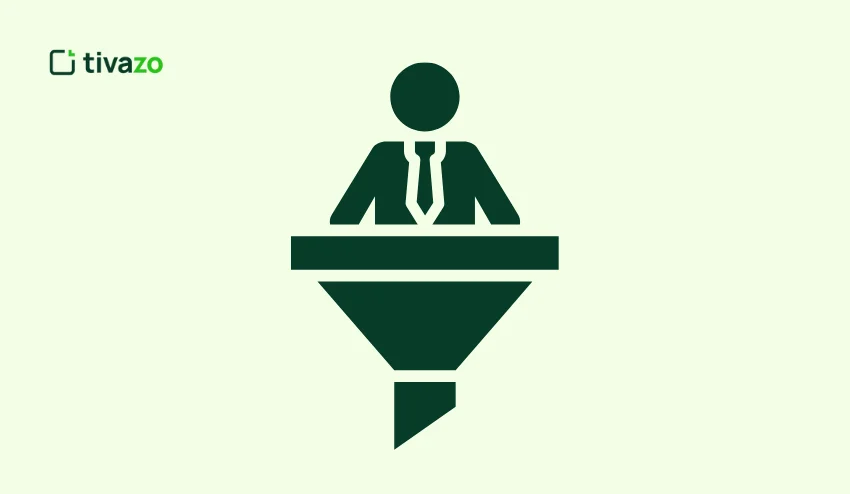Have you ever hired someone who looked perfect on paper but didn’t quite fit with the team? Or perhaps you have witnessed a new employee fail due to a mismatch between his or her work style and your company culture. Such cases are more common than most hiring managers would want to acknowledge.
My experience in the recruitment business over the years has taught me that peer interviews have revealed facts that the most structured interview may fail to detect. When properly conducted, they provide both parties with a better picture as to whether the candidate will be a long-term asset.
This guide will tell you what peer interview questions are, why they are important, what benefits they have, what kind of questions to ask, 25 real examples, and tips to make them effective. So, to begin with we need to know the fundamentals.
Key Highlights:
- What Is a Peer Interview?
- What Are Peer Interview Questions?
- Why Peer Interview Questions Are Needed
- Benefits of Peer Interview Questions
- Types & Categories of Peer Interview Questions + 25 Examples
- Common Peer Interview Mistakes to Avoid
- Best Practices for Conducting Peer Interviews
- How to Prepare for a Peer Interview
- How Peer Interview Questions Fit Into the Interview Process
What Is a Peer Interview?
A peer interview is a situation where a candidate is interviewed by other members of the team who may be the future team members instead of the hiring manager or the HR. The goal is to assess both the technical abilities and soft skills, communication style, and culture fit.
Unlike the traditional ones, peer interviews focus on how an individual works every day, how he/she deals with challenges, and how he/she collaborates with others. This helps to expose such qualities as emotional intelligence and teamwork skills that would have otherwise not been detected in a structured interview.
When used together with technical reviews and skills testing, peer interviews give a complete picture of the appropriateness of a candidate and avoid the costly mistake of hiring the wrong person.
What Are Peer Interview Questions?
Peer interview questions refer to questions posed by potential teammates and not only hiring managers. Such interviews allow current team members to assess the fit of a candidate to the team culture and dynamics of work.
They are not like a normal job interview. Rather than just focusing on technical skills, peer interviews tend to ask questions about soft skills, communication style, emotional intelligence, and the way a person would approach team projects or challenges at work.
This strategy is effective since the future co-workers are able to learn compatibility elements that the management may not notice.
Why Peer Interview Questions Are Needed
An interview procedure that does not involve peer feedback may miss out on critical attributes that define long-term success. Technical qualifications are as important as culture fit and the capacity to fit in the already existing team.
For example, I have once worked with a company that recruited a technically brilliant employee without peer assessment. In two months, the employee resigned due to conflicts between the team culture and productivity. Had they involved peer interview questions in the process, the mismatch would have been apparent.
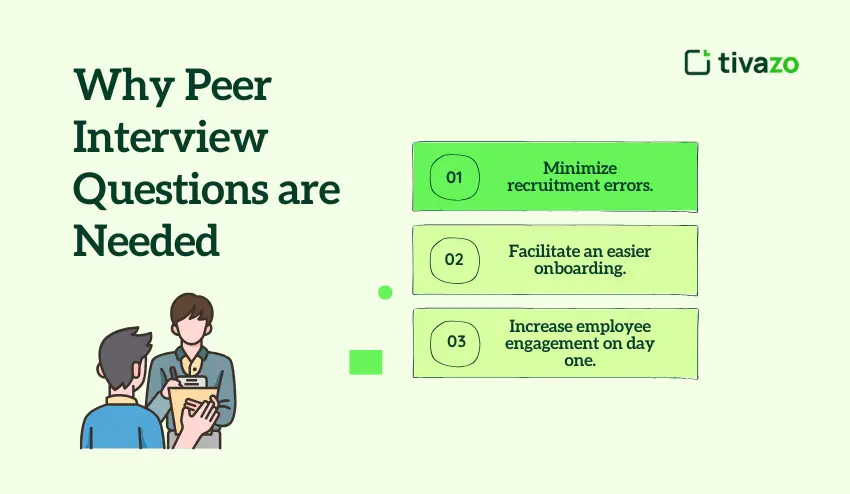
These questions help:
- Minimize recruitment errors.
- Facilitate an easier onboarding.
- Increase employee engagement on day one.
Benefits of Peer Interview Questions
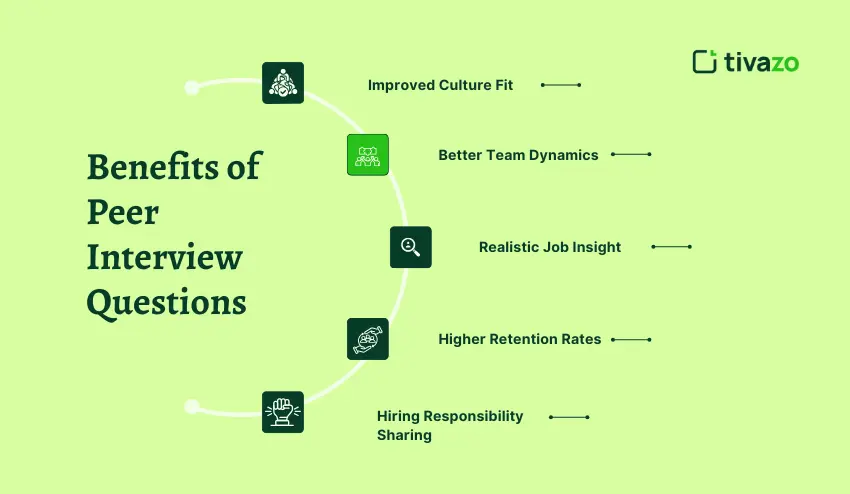
The benefits of including peer interview questions in your hiring process are obvious:
Improved Culture Fit
The teammates are the most appropriate individuals who can discuss their experience of the working culture and the environment. They are in the best position to decide whether the values, work style and personality of the candidate fits in the company culture or not. This will help you in hiring people who will integrate immediately.
Better Team Dynamics
The colleagues know the skills, attitudes and traits that will contribute to the improvement of the existing team. Their observations will have the capacity to indicate whether the candidate will integrate into the working style of the group or will destabilize it, and future cooperation will be more comfortable. Improving and understanding the team dynamics will help the team to be more productive.
Realistic Job Insight
When candidates are interviewed formally, they are normally presented with a glossed up version of the job. The use of a peer interview will also allow them to get raw and uncut answers about daily assignments, expectations, and team projects. This transparency helps the candidates to know whether the job is really suited to them.
Higher Retention Rates
Employees who are comfortable with the other members of staff and who can be assimilated into the team will be more likely to be engaged and stay long-term. When the cultural fit is good, the relationships are strengthened, job satisfaction is enhanced and the turnover issues are minimized.
Hiring Responsibility Sharing
Interviewing peers would make them feel like part of the team. When the employees are involved in the selection of their future colleagues, their engagement will be increased, and this will ensure that all employees feel invested in the success of the new hire.
In short, peer interviews benefit both the organization and the candidate, creating a hiring process that is more collaborative, insightful, and effective.
25+ Examples, Types & Categories of Peer Panel Interview Questions
When preparing peer interview questions, I group them into categories to make sure we’re assessing all the right areas. Below are the main categories with 25 examples you can adapt to your own interviews.
1. Culture Fit Questions
These questions revolve around the values, work style and approach of the candidate and how they fit in the company culture as well as in the culture of the team. When there is a good culture fit, there will be less conflict, easier collaboration, and improved long-term performance.
- What do you do when you are in a team that has a different way of working than you?
- Which features of a workplace culture are of the greatest importance to you?
- Give an example of when you had to adapt to new team culture.
2. Teamwork & Collaboration Questions
Teamwork is a very important skill in any position that requires group work. These questions are aimed at the way a candidate develops relationships, participates in team projects, and works in an already established team to achieve common objectives.
- What do you do when you disagree with team members?
- Tell me about your experience on a successful team project.
- What are the ways to guarantee successful teamwork in the projects?
3. Problem-Solving & Adaptability Questions
The modern work environment is a dynamic place and it is important to adapt. These questions are applied to assess the problem solving ability, adaptability and how a candidate would react to changes in the workplace.
- Provide an example of how you managed a change in a project.
- How do you manage when you are short of resources?
- Describe a time when you were required to solve a problem and you had no help.
4. Communication & Soft Skills Questions
Team success is based on good communication and active listening. The questions are meant to assess the communication style, emotional awareness, and the capacity of a candidate to relate with colleagues under various circumstances.
- What do you do to ensure that everyone in the team feels listened to?
- Give me an example of how you have changed your style of communication to suit a colleague.
- What do you do with peer feedback?
5. Professional Experience & Contribution Questions
These questions dive into the professional experience of the candidate and how he or she has contributed to the team in the previous jobs. They will also show whether their competencies can be used to improve your team.
- What is your most proud project in your former job?
- What have you done in your previous position to enhance team performance?
- Describe a skill that you have learned to make your team successful.
6. Skills & Competency Questions
In addition to cultural and team fit, you should understand whether the candidate possesses the technical and practical skills to shine. These questions assist in confirming outcomes of skills assessment or skills testing.
- What do you do to keep up to date with skills in your role?
- Is there a situation when your skills had a measurable impact?
- What is your approach to prioritize project and manage tasks?
7. Candidate Response & Work Style Questions
The way a candidate responds to pressure or when he/she is challenged can speak volumes. These questions assess the answers of the candidates, flexibility, and their input to the team dynamics.
- What do you do when somebody criticizes your idea?
- What is your usual role in a group?
- What do you do when you have a very different approach with someone?
8. Motivation & Engagement Questions
Long-term success requires motivation and commitment. These questions define what drives the candidate, how he/she stays motivated and how he/she can align his/her work to the goals of the team.
- What are you most looking forward to working with this team?
- How do you keep yourself motivated when you have to repeat the same thing?
- How do you ensure that your work aligns with team goals?
9. Wrap-Up Question
The interview should end with a reflective question that will ensure that both parties are on the same page and will be in a position to make decisions.
- What do you think you can bring to our team?
By employing a balanced combination of these categories, you will design a structured interview process that will help you identify both the hard and soft attributes that will make a person a great hire.
When you combine these categories, you will have a full-fledged view of the candidate fit.
Common Peer Interview Mistakes to Avoid
Even the most effective peer interview questions will not work when the process is faulty. These are the mistakes to avoid:
- Only generic questions.
- Failure to train peers on best practices in interviewing.
- Allowing biasness to dominate systematic interview assessment.
- Excluding note-taking when interviewing.
By steering clear of these, you’ll make interviews more accurate and fair.
Best Practices for Conducting Peer Interviews
To obtain reliable, practical results:
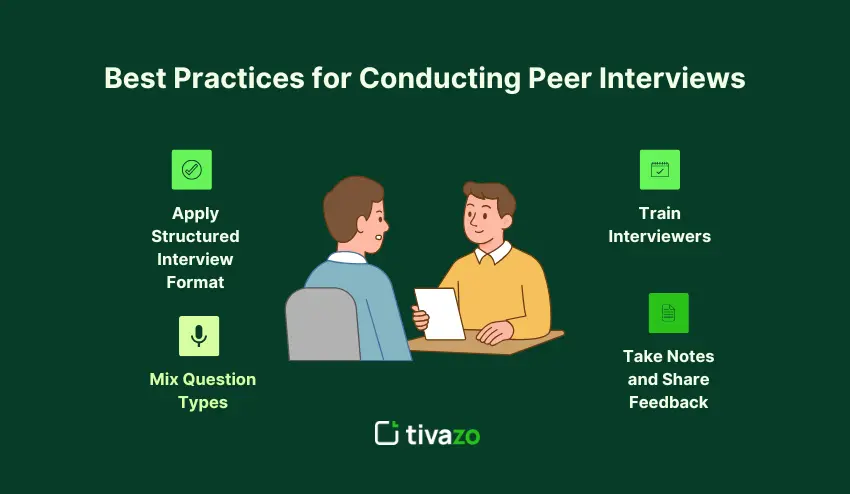
- Apply Structured Interview Format – Makes the process fair to all the candidates.
- Mix Question Types – Cover soft skills, problem solving and teamwork communication.
- Train Interviewers – Train them on how to be unbiased and make the discussions professional.
- Take Notes and Share Feedback – Take decisions based on group feedback.
In this manner, the peer interview is a useful component of the hiring process.
How to Prepare for a Peer Panel Interview Questions
If You’re the Interviewer:
- Before the interview, review the resume of the candidate and his/her working experience.
- Select the questions based on the needs of the position and your team.
- Be prepared to give truthful information regarding the company culture and day to day work environment.
- Be ready to listen attentively and watch the way the candidate relates with the team.
If You’re the Candidate:
- Find out about the team culture of the company through their web site, social media and employee reviews.
- Gather instances of teamwork, flexibility, and problem-solving at your prior employment.
- Rehearse with a friend or aloud to common peer interview questions.
- Pay attention to clear and confident communication and real life stories demonstrating your skills.
- You should be prepared to ask questions of your own regarding the team and culture to demonstrate interest.
Preparation makes both parties benefit most out of the discussion.
How Peer Interview Questions Fit Into the Interview Process
Peer interviews are usually conducted at the initial phases of screening but before decision-making. They support technical interviews since they focus on cultural fit, teamwork, and dynamics.
Combined with skills assessment and structured interviewing techniques, they form a balanced hiring process that is less risky and increases retention.
Unique Peer Interview Questions and Answers
Question 1 : Can you describe a time when you disagreed with a colleague and how you handled it?
Answer: “I once disagreed with a colleague on a project approach. I listened to their perspective, shared mine calmly, and we combined the best ideas from both sides. The project was successful, and it strengthened our teamwork.”
Question 2 : How do you handle feedback from a peer?
Answer: “I listen carefully, ask for clarification if needed, and use the feedback to improve my work. I see it as an opportunity to grow.”
Question 3: Describe a time you helped a teammate succeed
Answer: “A teammate struggled with a task, so I offered guidance and shared resources. They completed it successfully, and it strengthened our collaboration.”
Final Thoughts
The peer interview questions are not just a formality but a very strong tool to not only assess the skills but also how a person will fit in with your team. When selected wisely, they reveal strengths, identify weaknesses and provide a clear view of whether the candidate will succeed in your company culture.
With the help of the categories and examples in this guide, you will have a clear guide to making better hiring decisions and creating teams that will last and make results.
